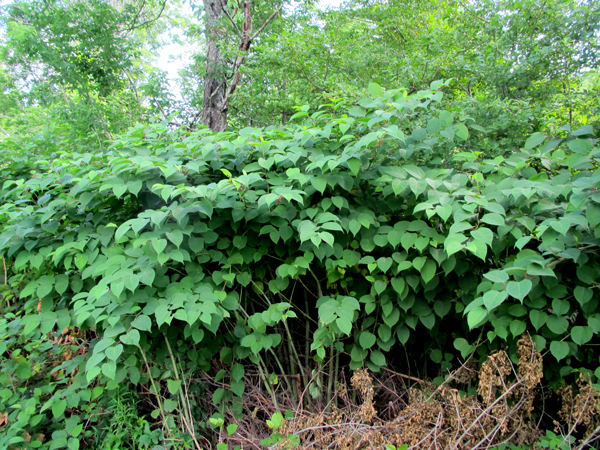It was a full house at the Waitsfield Conservation Commission’s July 17 meeting with several dozen people in attendance to comment on a plan to use herbicides as one tool to manage knotweed on the town-owned Austin parcel.
The discussion this week was a precursor for a full public forum that will happen next week on July 24 at Waitsfield Elementary School at 6:30 p.m.
Conservation Commission chair Phil Huffman explained that this week’s meeting was designed to set the stage for the forum and asked people to respect the fact that the commission had its full regular agenda to get through as well.
MOW A BUFFER
Huffman explained the process by which the commission had arrived on the proposed solution to the knotweed infestation on the five-acre Austin parcel. The plan is to leave the knotweed forest on the riverbank and mow a buffer strip between the knotweed and the inland portion of the parcel. On the buffer strip and inland the knotweed would be cut and the stalks treated with Rodeo, an herbicide containing glyphosate, and Polaris, an herbicide containing imazapyr. The herbicide application would happen twice a year for two years. Concurrently, native tree species would be planted to try to recreate a natural flood plain forest. This project is a pilot treatment plan that will involve approximately one acre of the five-acre parcel.
“I recognize and we all recognize that this is an important and sensitive topic in a variety of different ways and we are committed to open transparent process and dialogue in our community and in the broader Valley community,” Huffman said.
“I hope we can bring a spirit of reasonable civil public discourse to this, seeking the best possible outcomes. If we can’t do it in this community and Valley, then where is it going to happen?” he asked.
BOON FOR BEES
When the meeting was opened up to public comment, Waitsfield resident and farmer Dave Hartshorn said that the knotweed serves the function by keeping the river cooler and said it is a boon for bees. He said that when the practice of removing gravel from the river ended, it led to the full force of floodwaters hitting native trees species in the roots which effectively sheers them off.
Conservation commission Chris Loomis responded, noting that the proposed project is planned for inland.
Amy Todisco, Waitsfield, asked if it would be possible to remove the debris left on the Austin parcel by Tropical Storm Irene so that it could be mowed again. Huffman said that the Town Plan and the management plan for that parcel calls for addressing knotweed in some way and trying to re-establish a riparian forest rather than a return to mowing.
PUBLIC DOLLARS
Ben Falk, Moretown, told the commission that he was excited about the focus on recreating a flood plain forest and asked what happens after the two-year trial project. He also questioned the safety of glyphosate, noting that the state of California warns that it is a known carcinogen. He also questioned the justification of spending public dollars on Dow Chemical, the company that makes Rodeo.
Commissioner Leo Laferriere suggested that a more appropriate focus for this week’s meeting would be to hear from people about how they’d like the forum to unfold next week, rather than getting into specifics tonight.
Fayston resident Marge Keough said she’d be very interested in hearing more about the native species that have been established on that parcel. Another Fayston resident, Ned Kelley, asked if there were any longer-term studies on the efficacy of using glyphosate.
AQUATIC LIFE
Huffman said that information could be provided by the proposed contractor, Redstart.
Other questions from those in attendance were around the impacts of the herbicides on aquatic life, the reason for the knotweed infestation, nonchemical alternatives and what a native flood plain forest would look like.
Next week’s forum will be part of the Waitsfield Select Board’s regular agenda and the Austin parcel discussion will be moderated.
“We’re not dead set with plowing forward with this particular approach. As tense as the dynamic has been for us over the past week, this is a healthy dialogue to be happening. It’s an example of the public process working,” Huffman said.
“I’d encourage all of you, appreciate all of you more aptly, to try and foster the kind of dialogue we’ve had here tonight. This is all loaded with emotion, understandably. I feel it. We all feel it. We need to acknowledge that, but don’t let the emotion dominate the conversation,” he added.







